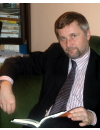Thomas Bak
Reader

- Psychology
- School of Philosophy, Psychology and Language Sciences
Contact details
- Tel: 0131 650 3441
- Email: thomas.bak@ed.ac.uk
Address
- Street
-
Room S3, Psychology Building
- City
- 7 George Square, Edinburgh
- Post code
- EH8 9JZ
Availability
I am happy to arrange personal meetings any time during the term. Please e-mail me on thomas.bak@ed.ac.uk to arrange a convenient day and time.
Background
Representative publications
- Bak TH, Long MR, Vega-Mendoza M, Sorace A. (2016) Novelty, Challenge, and Practice: The Impact of Intensive Language Learning on Attentional Functions. PLoS One. Published on-line 27 April 2016.
- Bak TH, Nissan J, Allerhand M, Deary IJ (2014) Does Bilingualism Influence Cognitive Ageing? Annals of Neurology 75 (6): 959-63.
- Alladi S, Bak TH, Duggirala V, Surampudi B, Shailaja M, Shukla AK, Chaudhuri JD, Kaul S (2013). Bilingualism delays age at onset of dementia, independent of education and immigration status. Neurology 81 (22):1938-1944.
- Bak TH, Chandran S (2012) What wires together, fires together: Verbs, Actions and Neurodegeneration in Motor Neuron Disease. Cortex, 48, 9367-944.
Blogs
- Skye is the limit – or, the power of mad ideas
- Sceptics and believers – or, how to find a path through confounding variables in bilingualism research
- Bilingualism and cognitive functions in brain diseases: from dementia to stroke
CV
Undergraduate teaching
- Cognitive Neuroscience (Year 2)
- Disorders of Language Functions (MSc)
- Clinical Cognitive Neuroscience (MSc in Integrative Neuroscience)
- Dementia (for medical students)
Office hours:
Tuesday 3pm - 5pm
Current PhD students supervised
- Brittany Blankinship
- Anke Lingscheid
- Jessica Schulz
- Lihua Xia
- Eva-maria Schnelten
- Monica de Icaza Valenzuela
- Anna Jones (PhD Molecular & Clinical Medicine)
Research summary
-
-
- Impact of language learning and bi-/multilingualism on cognitive functions and wellbeing across the lifespan
- Interaction between multilingualism, cognitive ageing/cognitive reserve and brain diseases (dementia, aphasia)
- Language-specificity of memory, changes in language use and preference across the lifespan and in dementia
- Language, movement & cognition: cognitive aspects of movement disorders and motor aspects of cognitive disorders
- Cross-linguistic and cross-cultural adaptation of cognitive assessment
-
A good insight into my research is given in my recent keynote lectures:
ABRALIN (March 2021): "Cognitive Neuroscience & sociolinguistics of multilingualism: a tale of two rivers"
https://aovivo.abralin.org/lives/thomas-h-bank/
EDINBURGH NEUROSCIENCE CHRISTMAS LECTURE (December 2020): "The executive brain: why concepts matter"
EDINBURGH LANGUAGE EVENT (February 2020): "Sex, drug & bilingualism: language learning between evolution, science & ideology"
https://www.youtube.com/watch?v=sMgMwLBcbqM
POLYGLOT CONFERENCE, REYKJAVIK (November 2017): "Cognitive effects of language learning: implications for smaller & indigenous languages"
https://www.youtube.com/watch?v=qNSGwH-qC3g
Finally, this "Brainwaves" interview with Penny Latin from BBC Scotland summarises well the main strands of my research:
https://www.bbc.co.uk/programmes/b09pz108
Current research interests
The interaction between bilingualism and cognitive functions across the lifespan and in diseases such as stroke and dementia. Cognitive effects of language learning. Relationship between language, cognition and motor function. Embodied cognition. Cognitive & linguistic symptoms in neurodegenerative diseases (e.g. MND, PSP, CBD, FTD, progressive aphasias). Crosscultural and crosslinguistic aspects of cognitive evaluation. Design and adaptation of cognitive and motor assessment to different languages and cultures.Project activity
Due to current restrictions, I am conducting most of my research on-line. You could help up us by filling in one or more of our on-line studies listed below:
STUDY 1 - LANGUAGE LEARNING
For all those who have ever learned (or attempted to learn) a language different from their first one (e.g. at university, while travelling, through social contacts etc). We have also a second version, for those who have taught a language: if you have done both, you can fill in both questionnaires, one with your student, the other with your teacher "hat" on:
https://edinburgh.eu.qualtrics.com/jfe/form/SV_cZLujTCJiNn6FRX
STUDY 2 - LANGUAGES ACROSS THE LIFESPAN
We are interested how languages develop acros the lifespan in people who speak more than one language. We have different versions of this survey: SELF-REPORT for those over 50y old & speaking more than one language & PROXY-REPORT, in which you can tell us about people you know (family, friends, people you cared for), who speak more than one language and are over 50y old; available in English, Chinese (traditional & simplified characters) & soon in Tamil.
https://edinburgh.eu.qualtrics.com/jfe/form/SV_6ySpqYdw2yyH1s1
STUDY 3 - LANGUAGE, MEMORY & IMAGINATION
In this study we would like to see how language shapes the way we remember things in the past and imagine things in future. This can be done either in one language (monolingual version) or in a bilingual version, if you speak two of the languages listed below. We have a European & an Asian set:
(a) EUROPEAN LANGUAGES: English, German, Spanish, Polish & French, or any combination of two of them:
https://edinburgh.eu.qualtrics.com/jfe/form/SV_6xOi22JqdkpigV7
(b) ASIAN LANGUAGES: Chinese, Tamil, Chinese/English, Tamil/English
https://edinburgh.eu.qualtrics.com/jfe/form/SV_8Ghqbi2MAMy9ax8
STUDY 4 - LEARNING CHINESE
This is a study for all who have learned Chinese, are learning it currently or would like to learn it some time in future (you do not have to speak a word of Chinese to fill it in, but we are interested what you think about the Chinese language). There is also a separate version for Chinese teachers:
https://edinburgh.eu.qualtrics.com/jfe/form/SV_ePQpPZz3gKk6orX
STUDY 5 - COGNITIVE & MOTOR SCREENING IN DEMENTIA & MOTOR DISORDERS CLINICS
You can help us with this very brief (5 mins) study if you are a clinician (doctor, psychologist, SLT, OT etc) working with patients with dementia and/or mootor disorders. We ask which kind of patients you see and which bedside screening tests (if any) you use:
https://edinburgh.eu.qualtrics.com/jfe/form/SV_8rbPIskKRmuANVz
Thanks a lot for your help
Dr Thomas H Bak
